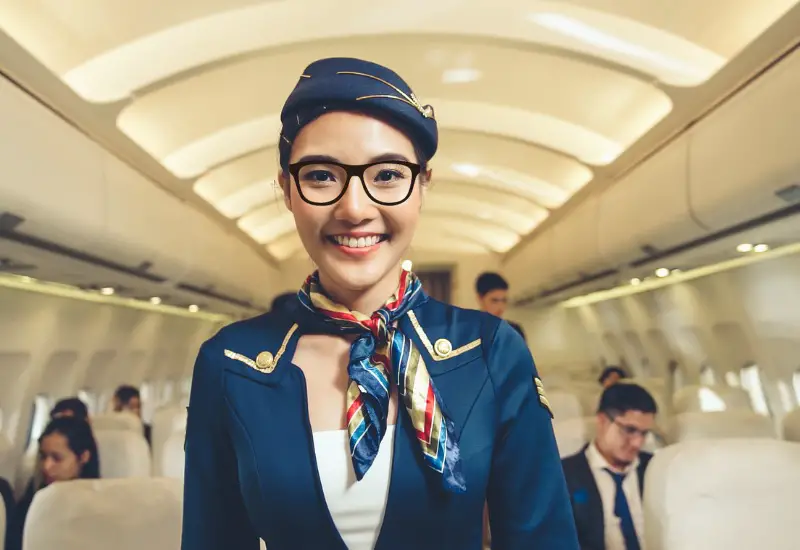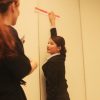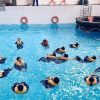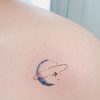For those who are working in the Western culture, this is a no-brainer question. How can a company put restrictions on my basic medical needs?
Unfortunately, this is not the case around the world.
Depending on the airline and their culture, there may be some restrictions on whether you can wear or what type of glasses are permitted according to their uniform policy.
Do Flight Attendants Need Good Eyesight?
The simple answer would be: it would make your life as a flight attendant easier, but it is not necessary.
There are different options to correct your vision such as glasses, contact lenses, or surgery.
However, you can lose your glasses or break them and they won’t be readily replaceable in a layover.
For contact lenses, the interior of the airplane is very dry so it will dry out your eyes quickly.
The longer you wear them in an airplane, the more uncomfortable wearing them becomes so eye drops and lubricants become extra things you need to carry.
Surgery is an option but you will have to consider the amount of money it will cost and the downtime from work to recover from that surgery.
Unfortunately, if you’re not blessed with good eyesight, you will have to deal with some type of inconvenience at work.
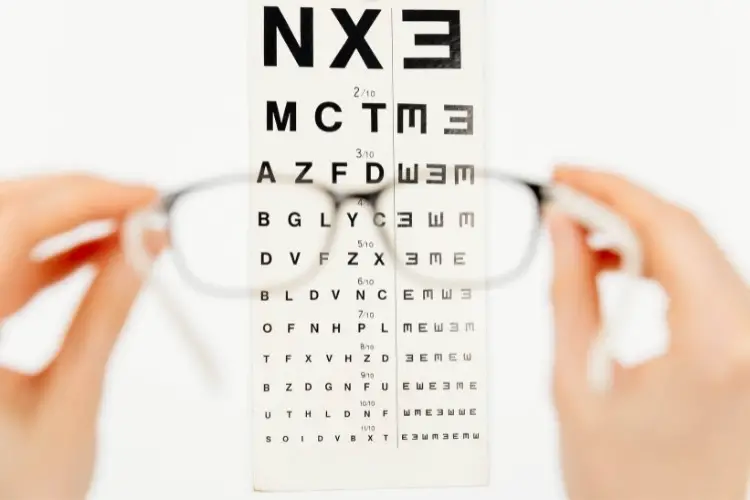
What Are the Eyesight Requirements for Flight Attendants?
In Europe
All applicants will be required to meet acuity standards which are 6/12 (20/40) in each eye separately and 6/9 using both eyes.
No matter the company, because this an European Aviation Safety Agency (EASA) regulation.
If a person has a visual acuity of 6/12 (20/40), he is said to see detail from 6 metres (20 ft) away; the same as a person with “normal” eyesight would see it from 12 metres (39 ft) away.
In the US
It depends on the airline, but you usually don’t see any visibility requirement in any of the airlines careers page – Delta, American Airlines, Southwest-, and there’s usually no eyesight test either, so for as long as you’re hired and you can perform your duties, you should be good.
However, in United Airlines it is written in their requirements and as a consequence, you must pass a vision test (each eye must be 20/40 or better corrected for both far and near vision).
Can Flight Attendants Wear Glasses or Contact Lenses?
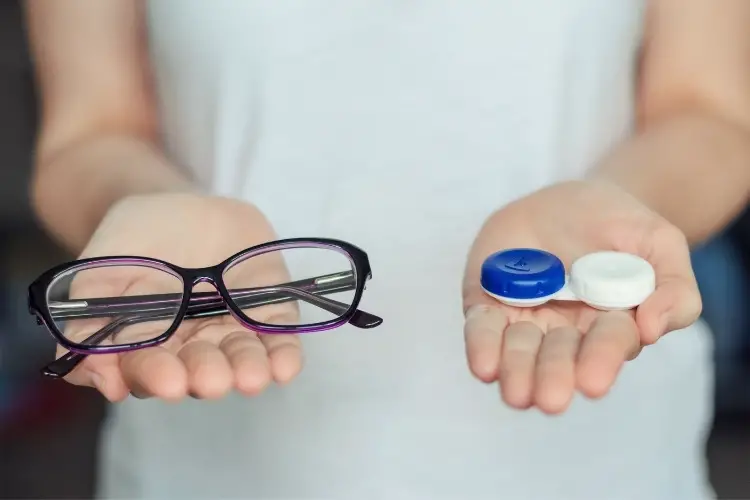
Western airlines are more lenient on uniform policies, especially in the US, and do not put strict limitations on the type of glasses you can wear as long as you look clean and professional.
Some choose to wear spunky glasses and they are allowed to do so to show off their unique character. While consistency and professionalism is important to any airline, diversity is also valued in these types of multi-ethnical airlines to connect to the passengers.
It becomes a great conversation starter where friendliness is a high-ranking quality of a flight attendant.
The policy becomes a bit stricter in the Middle East
For Emirates Airlines, you are allowed to wear glasses but need to provide documentation showing that it is necessary. The style of the frame has to be professional, within the guidelines of the uniform policy, and be approved by the grooming officer before it can be used on duty.
It is slowly changing, but some Asian carriers have the strictest policy of all
For example, Korean Airlines do not approve of wearing glasses stating that it is a safety hazard in case of emergency. In the event of an emergency evacuation, it could fall off or break and it won’t do well in water if they have to swim.
But bottom line is that they are very strict when it comes to appearances so it has to be contact lenses.
However, smaller South Korean airlines such as T’way Airlines and Jeju Airlines have made strides in improving the strict working environment by allowing not only glasses but nail art (within limits) and freedom in hairstyles. The companies brought forth the changes not only for the comfort of their employees but for their overall eye health.
The best glasses to wear to work would be something you are used to wearing every day
Try something light yet durable and not too expensive so that if you lose it or break it, you don’t cry over it.
And if you know you’re going to fly for an extended period of time, opt for glasses rather than contact lenses if possible because your eye health is long-term and more important than your image.
Double-check your airline’s policy on carrying an extra pair because while it is not mandatory in the US (your responsibility to bring whatever it is necessary to do your job), it is so in Europe.
Also, eventually, as we all get old, understand that you will need reading glasses.
In the Western culture where the retirement age as a flight attendant is older, many do wear them and even have accessories to keep track of them (necklaces, pins on the uniform to hang them, etcetera). If this is you, don’t risk losing your reading glasses or spending too much time looking for them all the time and just invest on some type of way to keep track of them.
Is It Ok To Wear Glasses at the Interview?
If you are unsure of the company’s policy, play it safe and wear contact lenses unless you think they will distract you and be so uncomfortable that you will not be able to do your best at the interview.
You are brought to the interview based on your background, experiences, skills, and professionalism.
If your choice of glasses does not align with the airlines’ then it could be changed after you get the job.
Don’t risk your opportunity for your dream job over glasses.
Whether glasses or contact lenses, make sure to check the airline’s policy on the topic so that you don’t make the wrong assumption.
Also, remember that your eye health is important and not to sacrifice it over image!
